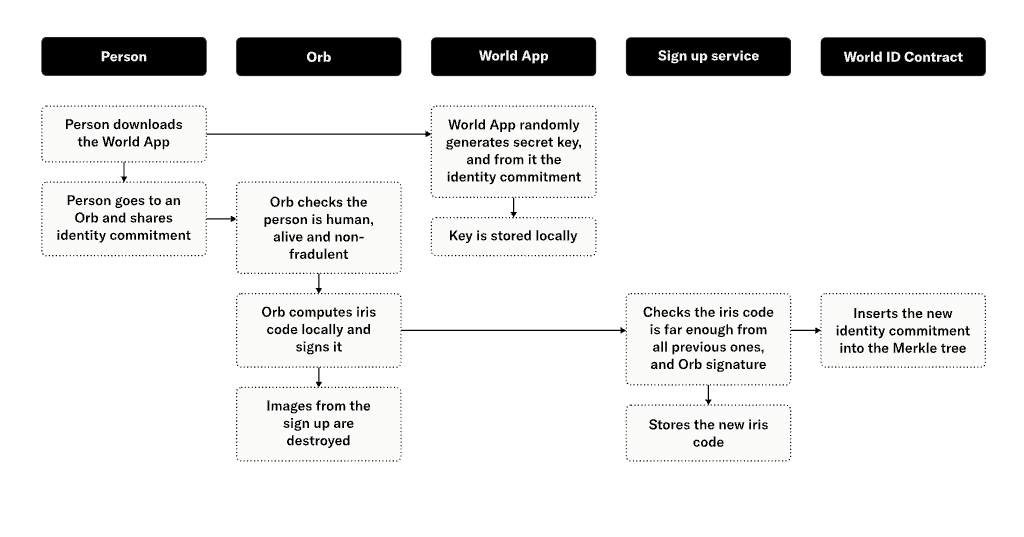What if--paradoxical though it sounds--you could get an ID while remaining anonymous? What if such a technology enabled the whole planet to free itself from the supremacy of Big Tech and the information it knows and compiles about its users? (And to the end of registering for a new cryptocurrency wallet?)
From the United States to India, via Kenya, Singapore, Germany, Spain and Portugal--but not yet in Luxembourg--in for the time being, passersby are starting to crowd around small metal balls known as “orbs” installed in shopping centres and cafés. The point? To have their irises scanned so as to obtain a unique identity, a “World ID”--as well as tokens, virtual Worldcoin coins.
In concrete terms, say promoters Sam Altmann and Alex Blania, the individual’s iris is integrated into a kind of digital jigsaw puzzle, which can only be registered in the database once and which cannot be falsified. The ball, manufactured in Germany mainly by Jabril and probably using 3D printing, is capable of knowing when a would-be identity thief is trying to scan a photo of an iris.
Eyes, face, chest and temperature recorded
“A series of high-resolution images of the eyes and face (head and shoulders) are taken. The aim is to check whether this is a living human being--and that includes measuring the temperature of the face and comparing it with a normal human body temperature,” says a . Thus, the orbs look at biometric data beyond simply the iris.
Having already attracted the wrath of MIT, Edward Snowden and the founder of Ethereum, the Altmann/Blania tandem is now in the sights of three European regulators, i.e. those of France, the UK and Germany--where the company has its own data protection officer. The regulators are questioning the nature and extent of the personal data that is captured in the onboarding process and the storage of this data.
“Organisations must conduct a Data Protection Impact Assessment (DPIA) before starting any processing that is likely to result in high risk,” says the UK regulator (ICO) in a statement, “such as processing special category biometric data. Where they identify high risks that they cannot mitigate, they must consult the ICO.”
“Organisations also need to have a clear lawful basis to process personal data,” the statement continues. “Where they are relying on consent, this needs to be freely given and capable of being withdrawn without detriment.”
“We note the launch of Worldcoin in the UK and will be making enquiries.”

The onboarding process as described by Worldcoin. Screenshot: Worldcoin
If you get yourself a World ID, you can of course use it in World App, Worldcoin’s digital wallet. Depending on which app store you get it from, however, World App can store your location data, contact details, contacts and identifiers, which--even if the company denies it--would be enough to paint a fairly high-resolution picture of you as a user.
On its website, the company explains that the wallet uses a zero-knowledge proof protocol, and that capturing the iris provides no other information about the individual. The data collected by the orb is destroyed “quickly,” once the puzzle has been solved. On 28 July, Worldcoin published a double audit report: 93% of the 26 indicators selected in this privacy context did not pose a problem.
According to data from Dune Analytics, more than one million wallets have already been put into service along with 522 million Worldcoin tokens (WLDs). Nearly 700,000 users have already claimed their “welcome tokens” linked to their orb scans.
Fundraising of $120m
In 2021, Worldcoin announced that it had raised $25m from investors including Andreessen Horowitz (a16z), Coinbase Ventures, Digital Currency Group (CoinDesk’s parent company) and angel investors including crypto billionaire Sam Bankman-Fried and LinkedIn co-founder Reid Hoffman. Today, it is in a new $120m funding round, sources believe.
Worldcoin is not alone in the highly controversial iris recognition market: according to Mordor Intelligence, the global iris recognition market was valued at $2.9bn in 2021 and is expected to reach $7.9bn by 2027. The growing adoption of multi-factor authentication services in government, aerospace and defence organisations is helping this market.
The US company Iris ID has been working in this market for more than 25 years. At the end of June, it reported that it was working for the FBI and most of the Fortune 100 companies, but none of the regulators batted an eyelid…
This article in French in Paperjam. It has been translated and edited for Delano.
